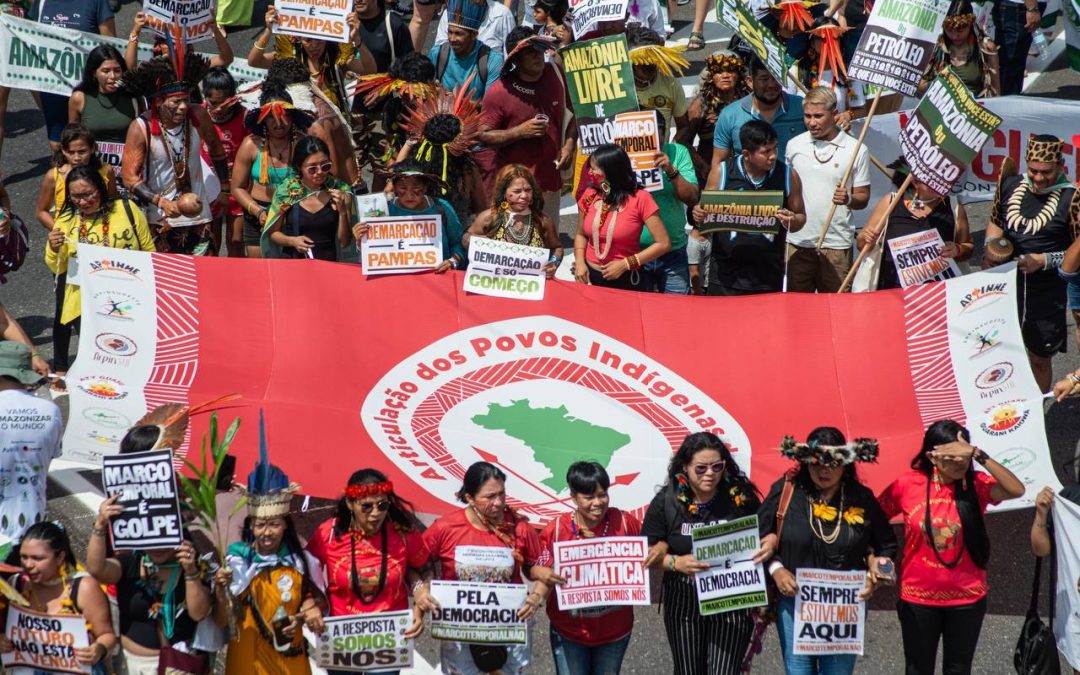The organization highlights the need for Amazonian countries to have defined actions involving the demarcation of indigenous lands, titling of quilombola territories and the creation of protected areas.
The eight presidents of the member states of the Amazon Cooperation Treaty Organization (ACTO) signed last Tuesday, August 8th, the Letter of Belém . The Letter is the main document of the Amazon Summit, which ends this Wednesday (09/08), in the capital of Pará. The Articulação of the Indigenous Peoples of Brazil (Apib), a national organization of reference of the indigenous movement, considers the Letter of Belém frustrating and demands concrete goals for the demarcation of indigenous lands.
“The document should be more ambitious. We understand there is a diversity of perspectives involving eight countries, and we recognize that political commitments were made, but the absence of specific and objective goals related to indigenous peoples and the environment is frustrating”, says Kleber Karipuna, executive coordinator of Apib.
Among the demands, Apib highlights the need for the Governments to define actions to address the point of no return in the Amazon (a term used by specialists to refer to the point at which the forest loses its ability to regenerate itself), which involves the demarcation of indigenous lands, titling of quilombola territories and the creation of protected areas. In addition to the monitoring and protection of territories and policies to support the sustainable use of those territories.
The indigenous movement also considers as disappointing the suspension of the announcement of demarcation of two indigenous lands during the Amazon Summit, as reported in the newspaper Folha de São Paulo . According to the report, the territories to be demarcated would be the Rio Gregório Indigenous territory, in Tarauacá (AC), and Acapuri de Cima, in Fonte Boa (AM). They are part of a list of 13 indigenous lands that are ready to be homologated , which was presented by the working group of Indigenous Peoples of the Transitional Government, of which Apib was part.
“The Government included the homologation of these 13 territories as part of the goals of the first 100 days of government. This goal was not met and, for the Summit, there was an expectation that other territories would be announced. The delay in this process has concrete Impacts on the indigenous peoples who are dealing with violence on a daily basis ”, emphasizes Dinamam Tuxá, who is also the executive coordinator of Apib.
Assembly of the Peoples of the Earth for the Amazon
Indigenous leaders from Apib and the Coordination of Indigenous Organizations of the Brazilian Amazon (Coiab) were in Belém for the Assembly of Peoples of the Earth for the Amazon , held between August 4th and 8th.
The Assembly was part of the political efforts of the indigenous movement to influence the IV Meeting of Presidents of the Signatory States of the Amazon Cooperation Treaty Organization (ACTO), Amazon Dialogues and the Amazon Summit.
During the Assembly, protection policies for isolated peoples were discussed, threats of exploitation by large mining companies and the oil industry, demarcation of ancestral territories, in addition to the resumption of the “time frame” case in the Federal Supreme Court (STF) (This would deny the claims of Indigenous communities to their territories if the communities cannot show that they were present on their lands when the 1988 Constitution was enacted).
On August 7, indigenous organizations in the Amazon published a document, “Letter from the Indigenous Peoples of the Amazon Basin to Presidents” . Delivered to the Amazonian presidents, the letter highlights the importance of dialoguing with the Indigenous movement to stop and solve the global climate crisis.
“Without us, there will be no Amazon; and, without it, the world as we know it will no longer exist. Because we are the Amazon: its land and biodiversity are our body; its rivers flow in our veins. Our ancestors not only preserved it for millennia, but also helped to cultivate it”, says an excerpt from the document.

